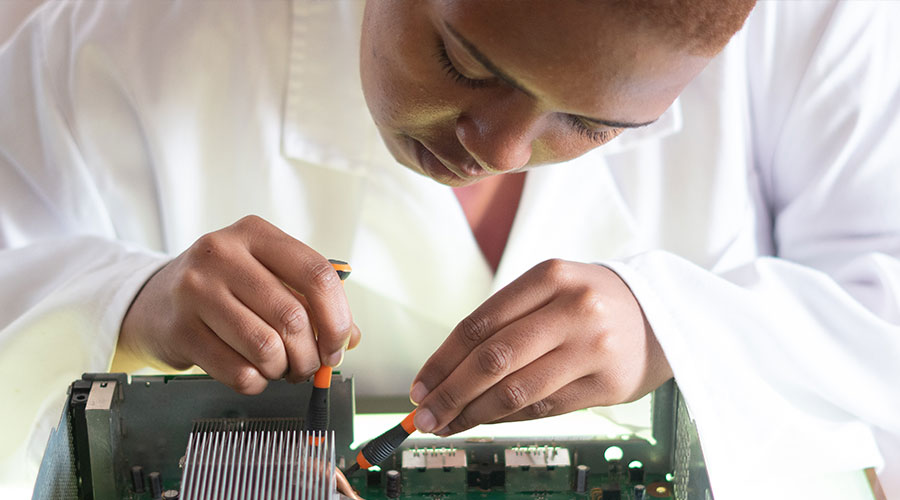Science, Technology, Engineering and Mathematics, or STEAM, has one of the broadest career fields of any particular area of study. The industry is also one of the fastest growing, with an expected employment increase of 11% by 2029, according to ComputerScience.org.
Not only is it a broad and growing industry, the median salary is $77,400 — significantly more than the median salary of $61,310 seen in the communications field. High pay and industry growth both translate into strong career opportunities that can help individuals create wealth and provide a stable foundation for generations to come.
While the STEM field presents much opportunity, it has long struggled to create inclusive and diverse work environments. According to the U.S. Census Bureau and Pew Research Center data, African Americans, Hispanics and Native Americans make up about 32% of the nation’s population but only 17% of the STEM workforce.
Additionally concerning is the pay gap between the top earning White and Asian workers, and lower paid African Americans, Hispanics and Native Americans in STEM. The median salary for STEM workers who identify as White or Asian is over $80,000, compared to $59,380 for African Americans and Hispanics. (Note: at the time of publication, there was no available data for Native Americans in STEM from the U.S. Census Bureau, Pew Research Center or Sandia National Laboratories.)
The Struggle to Be Published
Underrepresentation and the large pay gap are two issues desperately in need of being addressed. However, for those African Americans, Hispanics and Native Americans that do enter the STEM workforce another problem has presented itself — getting their work published. Publication is one of the most valuable ways in which scientists and researchers are able to demonstrate their expertise, as well as the academic prowess of the institution they work for.
In an article by Chelsea Long for The Chronicle of Higher Education, it’s noted that African American authorship in both medical research and mathematics is under 6% of all published materials. In mathematics specifically, the number hasn’t risen since 2010.
Hispanic authors face similar obstacles, as their authorship in biochemistry decreased from 5.2% to 4.8% from 2019 to 2020.
The article goes on to cite Shirley Malcom, director of the SEA Change initiative at the American Association for the Advancement of Science, who points to inequalities among faculties at R1 Research Institutions — schools that meet certain levels of research and funding, judged by Carnegie Classification of Institutions of Higher Education — and the lack of funding and other resources for professors at Minority Serving Institutions (MSIs) as key factors holding back potential increases in diverse authorship.
Robert F. Smith’s Work for a More Equitable STEM Field
In order to overcome these glaring disparities, individuals and organizations will have to come together to generate protocols and funding to increase diversity in STEM, and support the diverse array of workers already in the field.
A core tenet of Robert F. Smith’s philanthropy, Smith works with multiple organizations that are addressing issues of STEM diversity, workplace equity and educational opportunity head on.
Smith’s work with Fund II Foundation, and specifically Student Freedom Initiative, is aimed at addressing diversity in STEM at the college level. Student Freedom Initiative is partnering with many HBCUs to help increase STEM students’ social and economic mobility, providing an income-contingent alternative to Parent Plus and private loans, as well as resources to aid student success. The organization is also aiding its partner schools and is committed to providing the resources needed to transition many of them to R1 Research Institutions.
In addition, Smith recently donated $15 million to his alma mater Cornell University for the establishment of scholarship funds at the undergraduate and graduate level that will go to diverse students attending the University’s College of Engineering.
“My goal has always been to lift up and provide opportunity for those who have historically faced barriers to success,” said Smith at the time of the donation. “My hope is that these funds will elevate more students and afford them the opportunity to attend my alma mater and pursue careers in STEM.”
To address issues of workplace diversity Smith has partnered with numerous organizations, including the Thirty Percent Coalition and Opportunity Network — looking at issues in diversity from the board of directors and down throughout companies across the nation.
Watch Robert F. Smith take part in the 2020 Thirty Percent Coalition annual meeting on YouTube.
